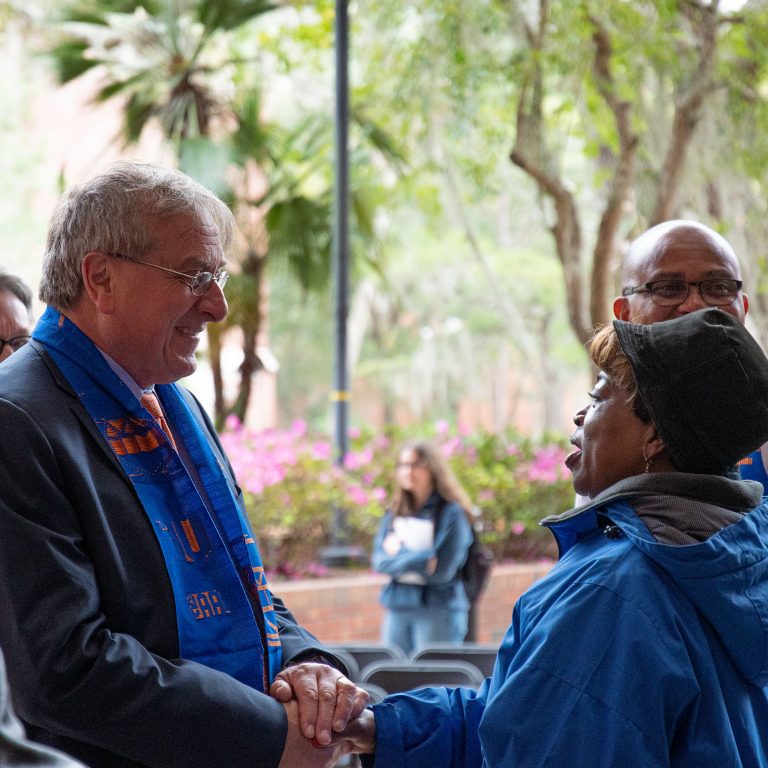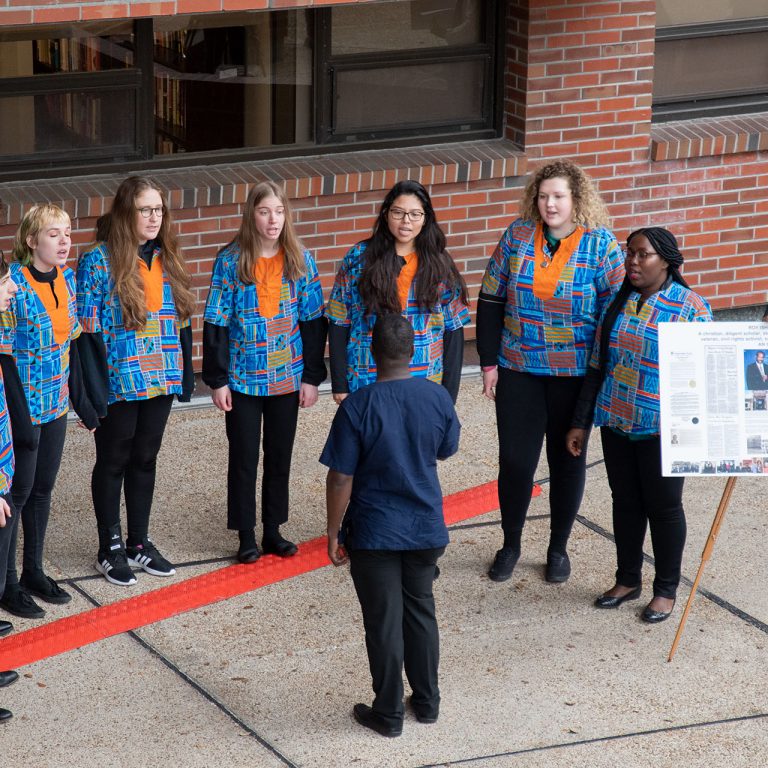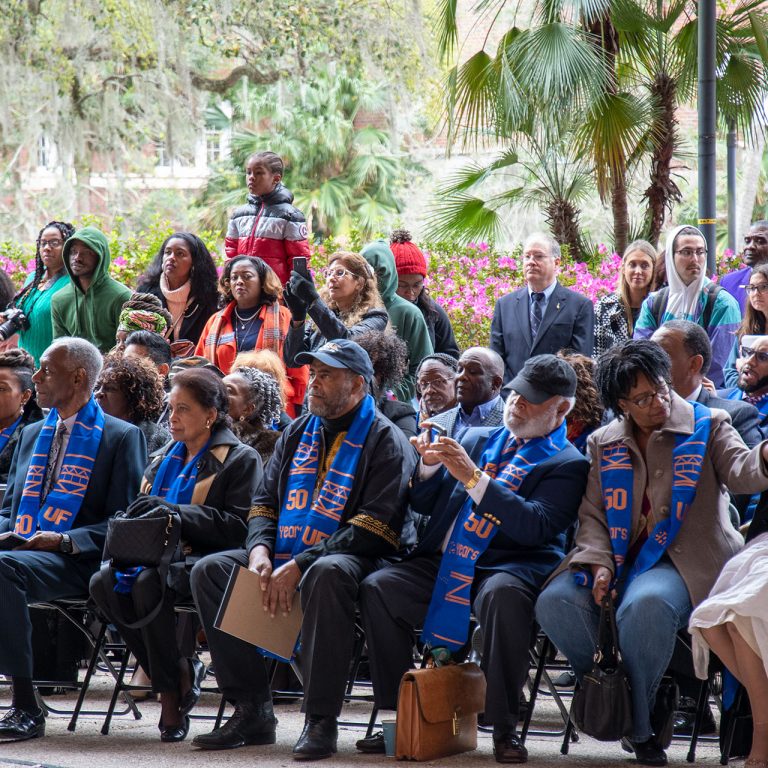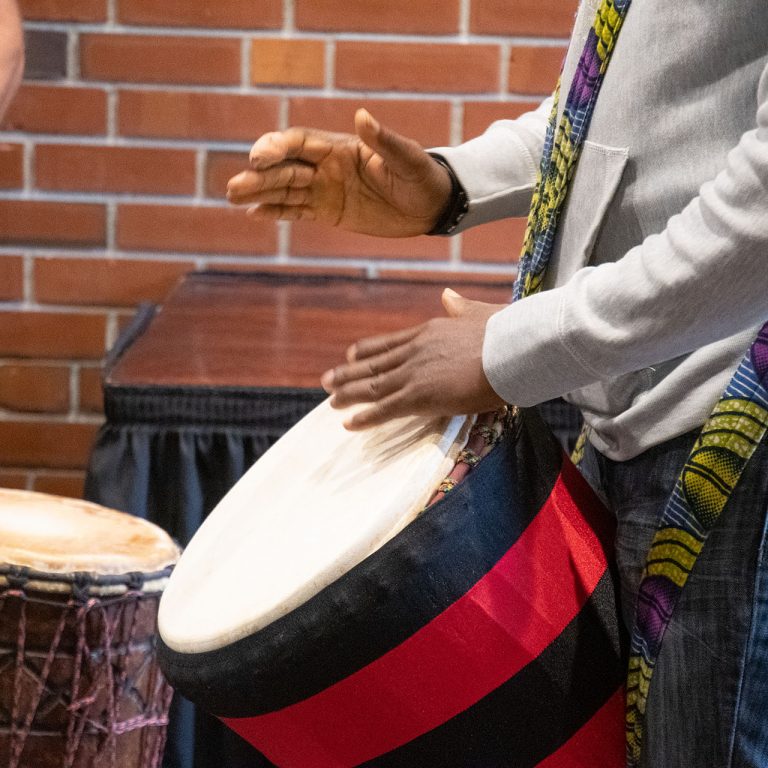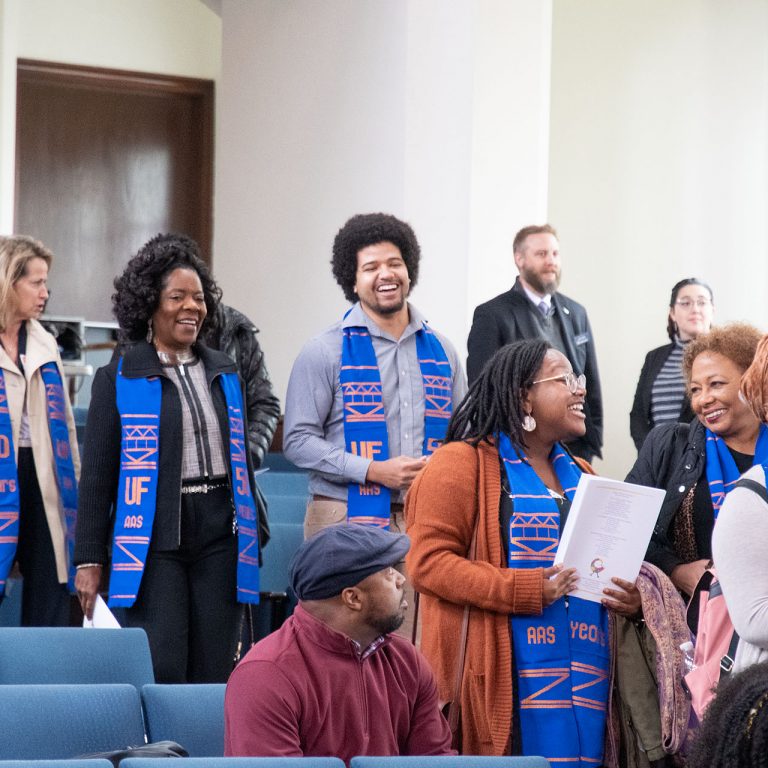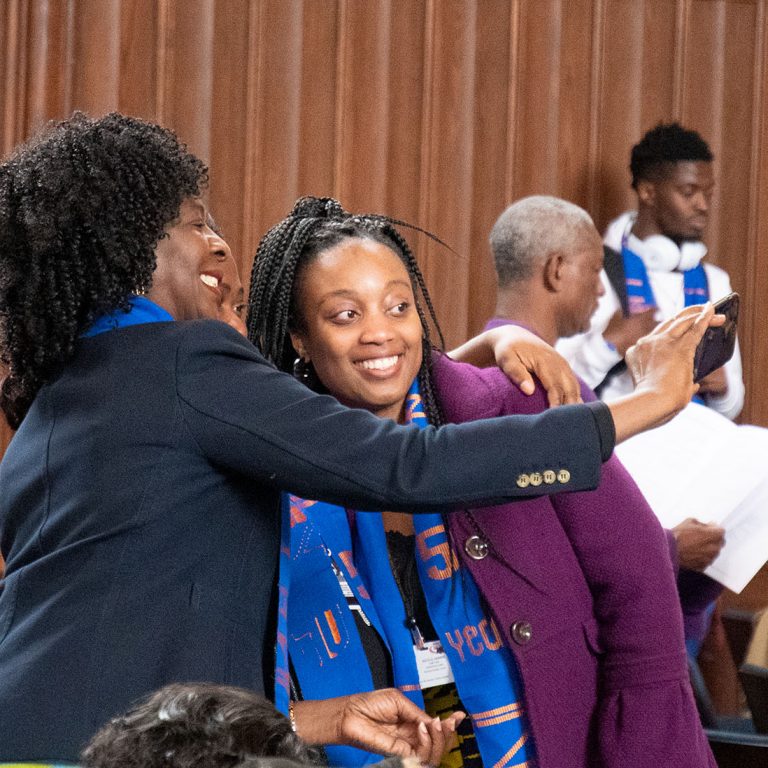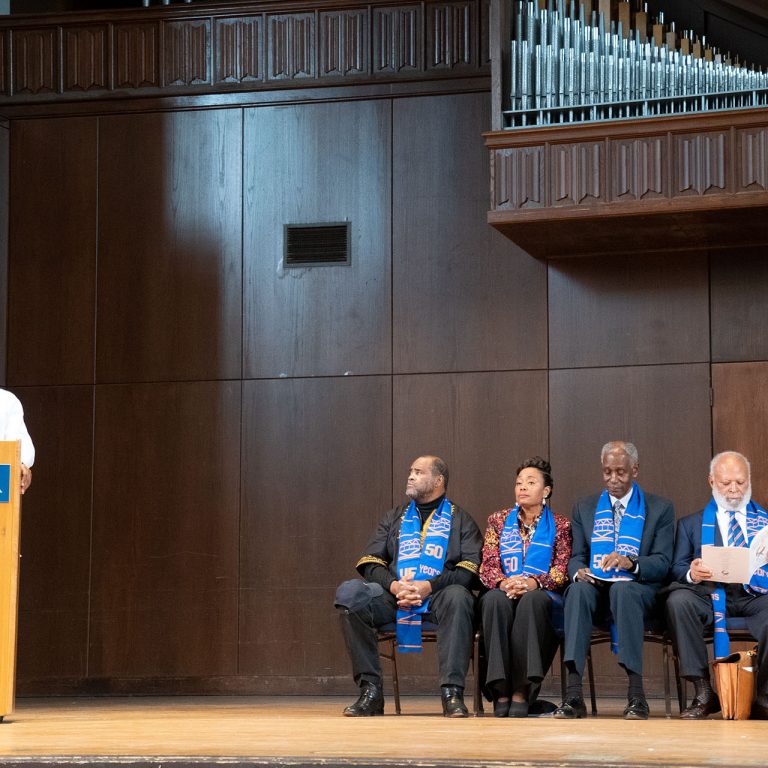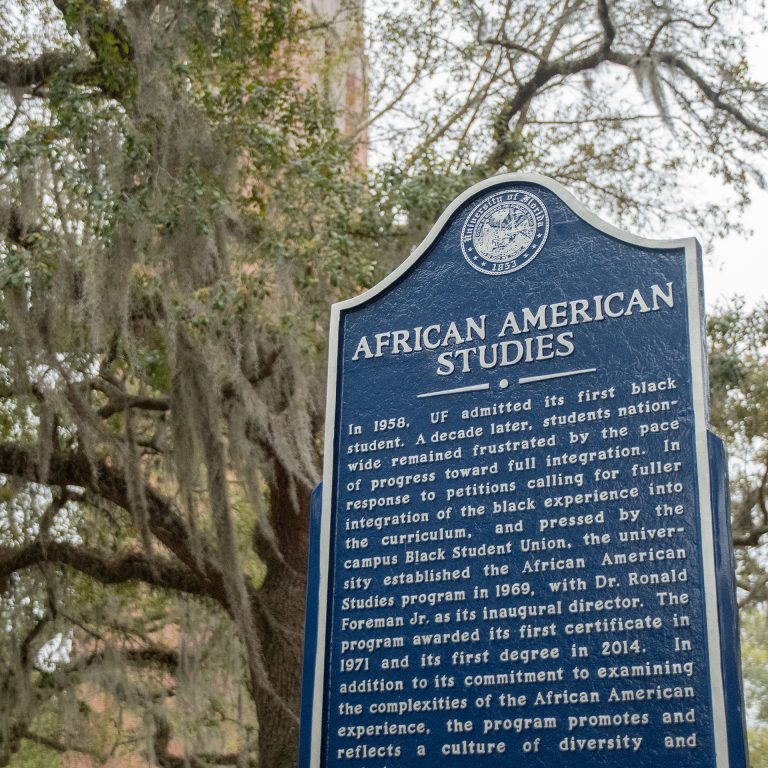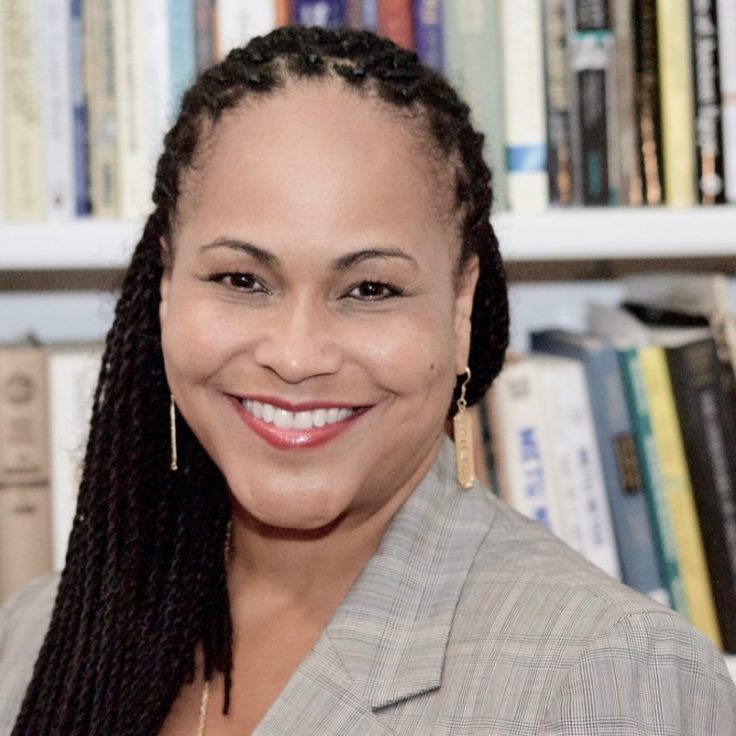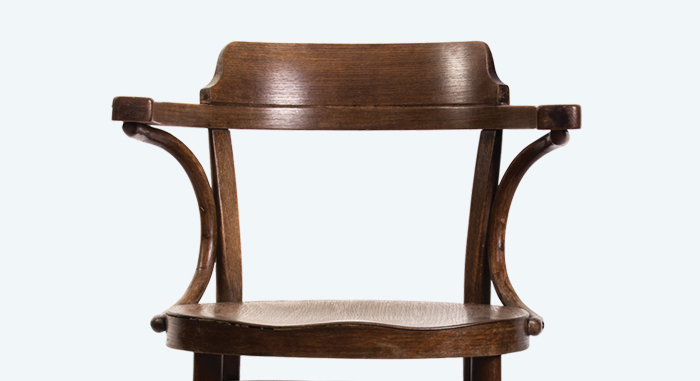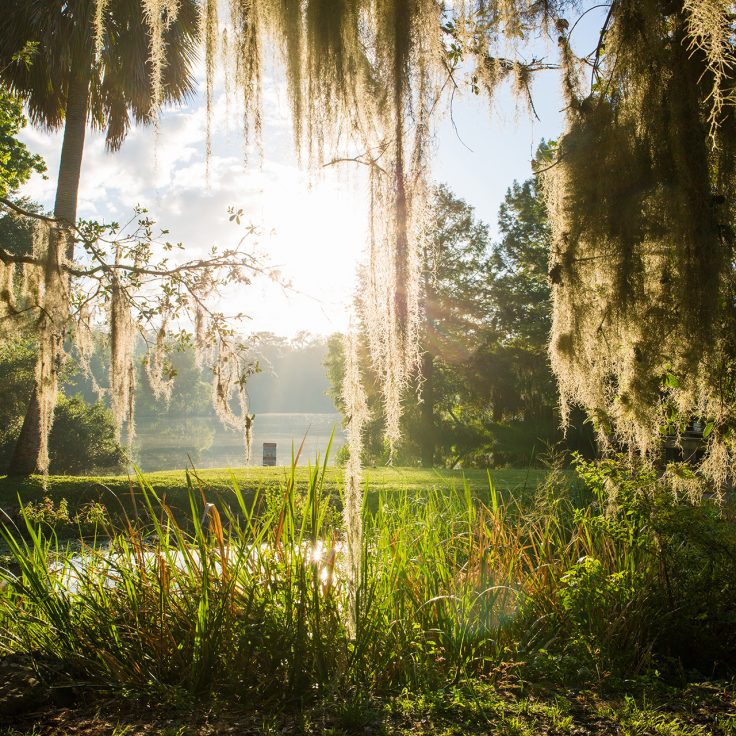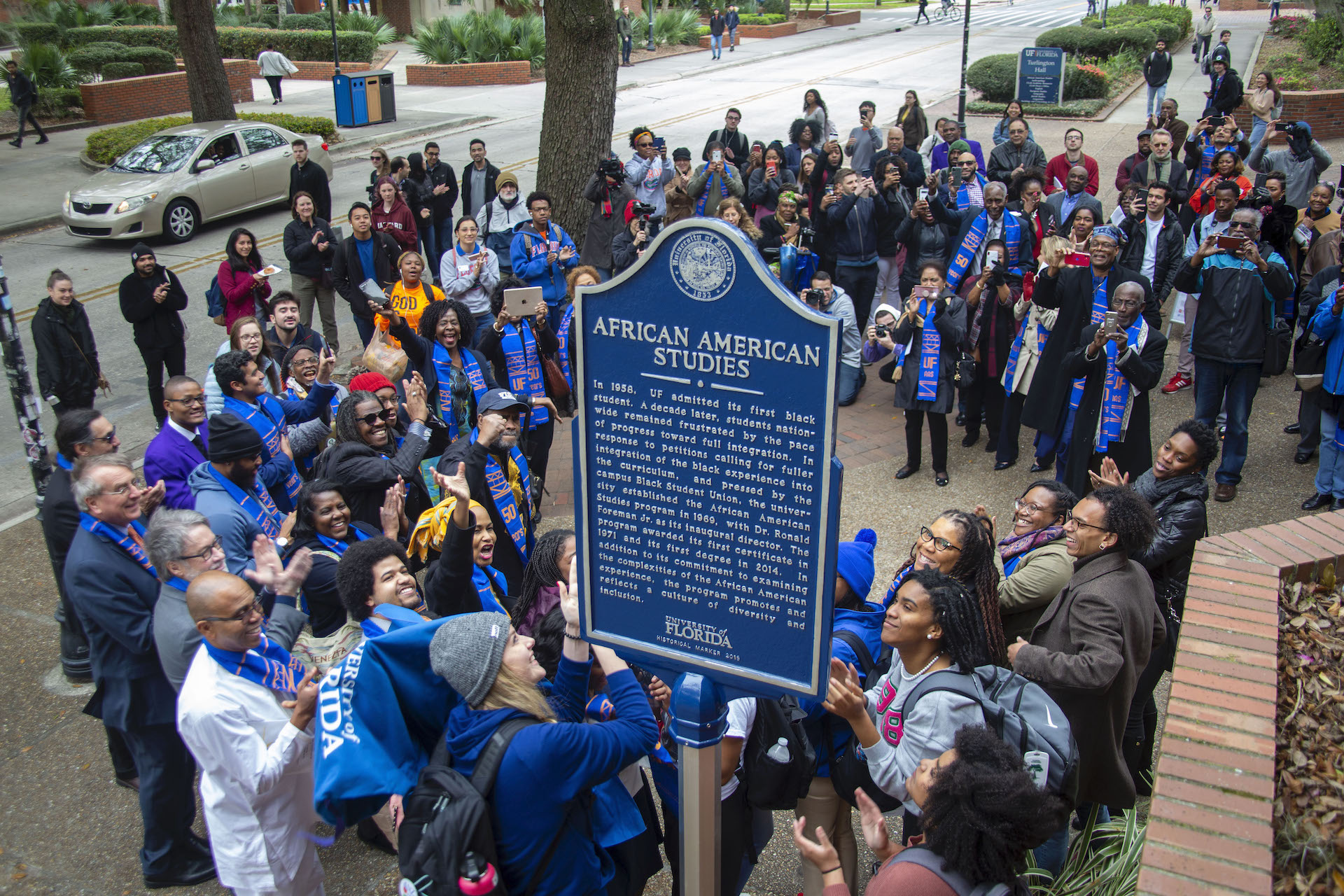
From One Milestone to the Next: African American Studies at UF
More than 50 years since the story began, an exciting new chapter awaits
When more than 100 people gathered on Turlington Plaza on February 21, 2020, to recognize and celebrate the 50th anniversary of African American Studies at UF, the occasion marked five decades of progress, dedicated scholarship and hard work. But those facets don’t tell the whole story: This milestone was also the result of struggle.
For the African American Studies Program, struggle is an essential part of the story. Its mere existence came in the face of resistance — the kind of resistance regularly mounted against grasps for an equitable world. But time and time again the program, home to one of the college’s fastest-growing majors, has demonstrated its resilience, proving the value that the discipline offers to students craving not only a well-rounded education but a more just society. Now, a half-century after the program’s founding in 1969, its vital role stands to receive a long-sought recognition. Under the leadership of newly hired director David A. Canton and with commitment from Dean David Richardson, African American Studies at UF is seeking to become the College of Liberal Arts and Sciences’ newest department.
Dean Richardson has committed to four tenure-track lines for African American Studies, which has thus far largely relied on lecturers, affiliate faculty and visiting professors to support the growing demand for its offerings. Accompanying this expansion is a newly constructed area within Turlington Hall that will provide dedicated space for its scholars and students.
Despite the institutional support, those long-involved in the program know the struggle is far from over. Even this year, the program suffered a major trial: On August 5, Patricia Hilliard-Nunn, a senior lecturer, dedicated historian and stalwart voice in the community, died at 57 years old. She not only enriched the program with her mentorship and scholarship but used her work to chronicle its past struggles. Her loss was deeply felt throughout UF and the greater Gainesville community.
In the face of this blow, the program pushes on, with ambitions that aim even higher than department status — its faculty, staff, alumni and supporters believe UF can and should establish itself as a national destination for African American Studies. Drawing on the lessons and foundation established by their forebears, African American Studies at UF is up for taking on the challenges ahead.
“I know that the University of Florida can be the leading higher education institution in this region for African American Studies,” said Jacob Gordon, a member of the program’s advisory board and a Professor Emeritus of African and African American Studies at the University of Kansas. “We have the potential. We have the history. We just have to muster resources to get it done.”
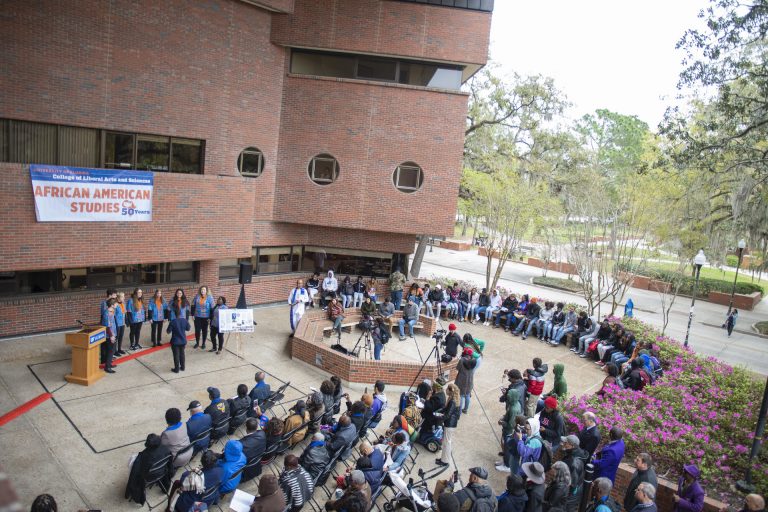
Throughout a two-day event, the 50th-anniversary celebration took a comprehensive look at the program’s past, present and future. After a day of panels that highlighted academic work, civic engagement and alumni perspectives, the event closed with a community celebration that brought together a wide representation of those who have contributed to the endurance of African American Studies at UF: alumni who first pushed for the program’s creation; the faculty and administrators who have shepherded the program from its founding to today, including Sharon Wright Austin, the political science professor who directed the program from 2011-19; the current students and recent graduates who continue its legacy; and members of the greater Gainesville community with whom the program has long fostered connection. Current and former students offered reflections, while musical performances rang out from the likes of UF’s Pazeni Sauti Africa Choir. Those responsible for the program’s establishment and early years, including original program director Ronald C. Foreman and Harry B. Shaw, professor emeritus and former associate dean of the College of Liberal Arts and Sciences, were recognized for their contributions.
The event also marked the unveiling of a historical marker on Turlington Plaza that notes the program’s founding came in response to a call for “fuller integration of the Black experience into the curriculum.” UF was far from the only institution in this movement: African American Studies at UF bloomed out a period of widespread social upheaval when nationwide movements against racism and segregation resulted in new societal, legislative and institutional changes. But when David L. Horne first arrived as a student at UF in 1964, his personal goals — and those of the few other Black students — were somewhat more modest, he recalls.
“The first couple years, we just tried to survive and get through university,” said Horne, a Professor Emeritus of Africana Studies at California State University Northridge. It had only been a few years since UF, following extended court fights, finally allowed the first Black student on campus in 1958. For Horne, who grew up in segregated Jacksonville, acclimating to the predominantly white college campus while focusing on coursework was a preoccupation unto itself. Not only was his family back home depending on his success, but he believed early cohorts of Black students at UF were viewed widely as “test cases” for integrated higher education.
By the time Horne moved into graduate school at UF, a wave of student activism across the country from the likes of the Student Nonviolent Coordinating Committee encouraged Black students at UF to demand more. They wanted the school not only to tolerate their presence but to embrace Black students, hire Black faculty members and support the study of African American history.
“Florida, both the state and the university, had left out of its history a lot of the valuable contributions and participation by African Americans,” Horne said. “I did not get that kind of info in textbooks — I got it from Black teachers and counselors, but not from the books given by the school board. That had to change.”
Their activism — through letter-writing, meetings with administration and protest — produced early results in 1969 and 1970: the establishment of the Black Student Union, the creation of what would become the African American Studies Program, and the hiring of new Black faculty members such as Ronald C. Foreman, the program’s first director. “We felt like we were making some progress. People were listening, and the administration was not completely closed off,” Horne said. “But then there was a gigantic step backwards.”
Still believing progress needed to be made, students made further demands for support for Black students, the hiring of Black faculty members and, notably, the designation of African American Studies as a full-fledged department, with all of the institutional credibility and support that entailed. In stark contrast to earlier discussions, these requests were met with flat refusals from University President Stephen O’Connell’s administration. In response, students organized to lead protests on campus and a sit-in at O’Connell’s office in Tigert Hall on April 15, 1971, presenting a list of 10 demands. As tensions escalated, police arrested 66 students, most of whom also faced academic probation in what came to be known as “Black Thursday.” The administration’s refusal to grant lenience to these student activists led to 123 Black students, about a third of the school’s Black population, to withdraw from the university.
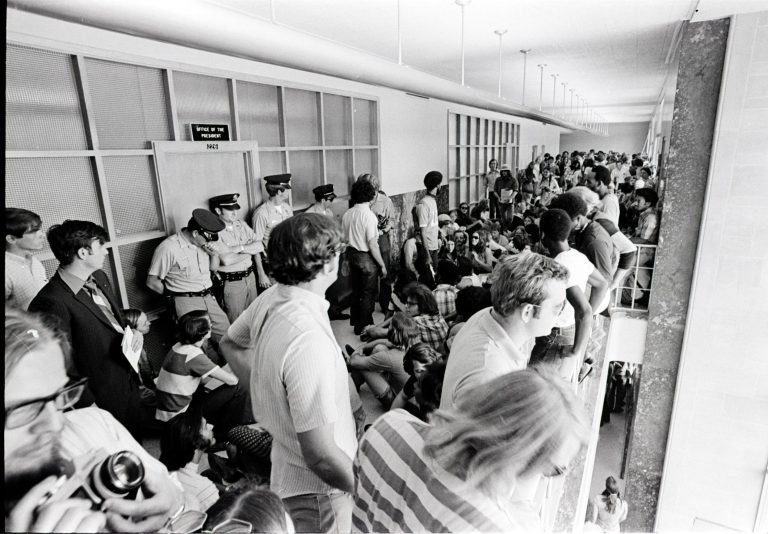
In the following decades, new milestones were met: the first certificate in Black studies was awarded in 1971, the program began offering a minor in 2006, and a degree in African American Studies was approved in 2013, when the program was led by Sharon Wright Austin, with the first majors graduating the following the year. Nearly half a century after student activists first demanded African American Studies become a department, those involved with the program agree that the prospect seems more assured than ever, with unprecedented institutional support from the college.
“Different people ‘get it’ now,” African American Studies Senior Lecturer Patricia Hilliard-Nunn said before her passing in August. In 2014, she produced a documentary about the history of the program called “45 Years of Triumph and Struggle: African American Studies at UF.” “They’re putting the resources and the human power into making it happen. That’s happening now.” Clear steps have already been taken demonstrating the College’s seriousness about bolstering African American Studies. The college enlisted the firm Isaacson Miller to manage a nationwide search to find top candidates to lead the department’s next chapter.
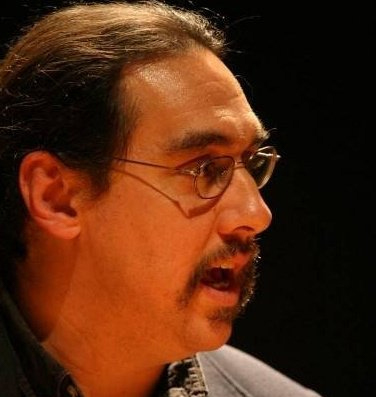
It’s about understanding how you build democracy and equality. In other disciplines, we too often take these things for granted.
—Paul Ortiz, director of the Samuel Proctor Oral History Program
The new director, David A. Canton, comes to UF with a long resume of leadership and scholarship. At Connecticut College, he led the Africana Studies Program, and previously served as the school’s Interim Dean of Institutional Equity and Inclusion, Chair of the Department of History, and Director of the Center for the Study of Race and Equality. He arrives eager to shepherd the creation of the new department and the search for new faculty. The newly renovated space in Turlington Hall, too, is a signal that the program and its students won’t be left on the margins.
“You have to have an anchor. We need a place where we can build our culture as we’re growing,” Hilliard-Nunn said. “And for students, it’s very valuable to know that a space is there for them.”
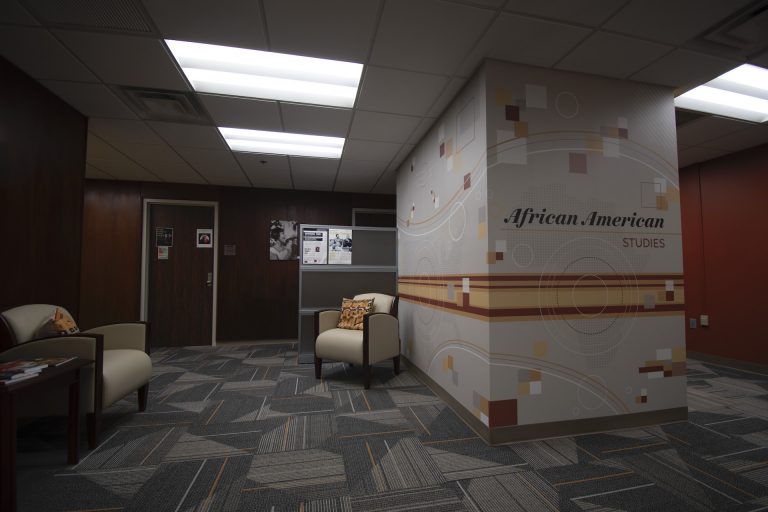
These moves come as interest in the program continues to rise among students. African American studies is one of the college’s fastest-growing undergraduate majors. On the horizon, African American Studies at UF looks to introduce Masters and PhD programs, further encouraging the palpable student enthusiasm for the subject. “To know is to love us,” Hilliard-Nunn said. “I often tell students in my intro classes, ‘You’ll be back.’”
The program’s offerings hold even more urgency in light of political and cultural movements that have taken hold recently. Protests spurred by the killings of Black Americans including George Floyd, Breonna Taylor and Ahmaud Arbery have shone a spotlight on the work still needed when it comes to achieving equality.
“The contributions of African Americans have been downplayed in the country’s history, and our current political situation makes it more important that we recognize them,” said James Essegbey, the interim director of the program from 2019 to 2020. “When you look at the history of civil rights, you realize some of the gains have been lost.”
Paul Ortiz, director of the Samuel Procter Oral History Program and a professor of history, said these recent crises emphasize how African Americans face questions that get to the core of a liberal arts education. “It’s about understanding how you build democracy and equality. In other disciplines, we too often take these things for granted,” Ortiz said. “When trying to understand the Black experience in America, you can’t take ideas like freedom for granted. Black studies get at the root of these big concepts.
“How are we putting into action these values of community building, of solidarity, of working on behalf of underserved?” Ortiz asked. “These are core values, and unless we’re putting them to work, we’re not fulfilling our core mission.”
But the value of African American Studies isn’t only in its advancement of essential ideals. The field — and the discipline, creativity and critical thinking it instills — is also starting to be recognized as a valuable launching pad as students enter the job market. “Our majors and recent graduates are making the case for us,” Ortiz said. “A lot of parents are now sold on the fact that African American Studies can be a great stepping stone to a really great career.”
An understanding of African American Studies is valuable no matter what field you pursue, said Jacob Gordon, the advisory board member. “African American history is the path of the American story from the very beginning to the present time,” Gordon said. “We can’t minimize it. It should be taught not only in history, but in all endeavors. To exclude that is to diminish the greatness of America.”
The legacy and influence of the African American Studies program at UF extends beyond its students, faculty and others formally involved — and beyond the bounds of the campus. The program’s relationship with the broader Gainesville community has been a foundational component since the very beginning. For the early cohorts of Black students at UF, the campus wasn’t always the most welcoming environment. In search of a sense of community and belonging, David Horne said he and his fellow students often looked to the off-campus Black community for support. “They helped us to survive,” Horne said. “They gave us spiritual grounding we needed.”
That relationship has continued to strengthen over the decades, with African American Studies’ students and faculty actively involved in volunteer work with the community, social justice campaigns on the local level, and support for institutions such as the Cotton Club Museum and Cultural Center. It’s a component of the program that new director, David A. Canton, is passionate about, seeking to strengthen the university’s relationship with the surrounding community. “African American Studies can play an important role in those conversations,” he said. Educators, he added, should also learn from community members.
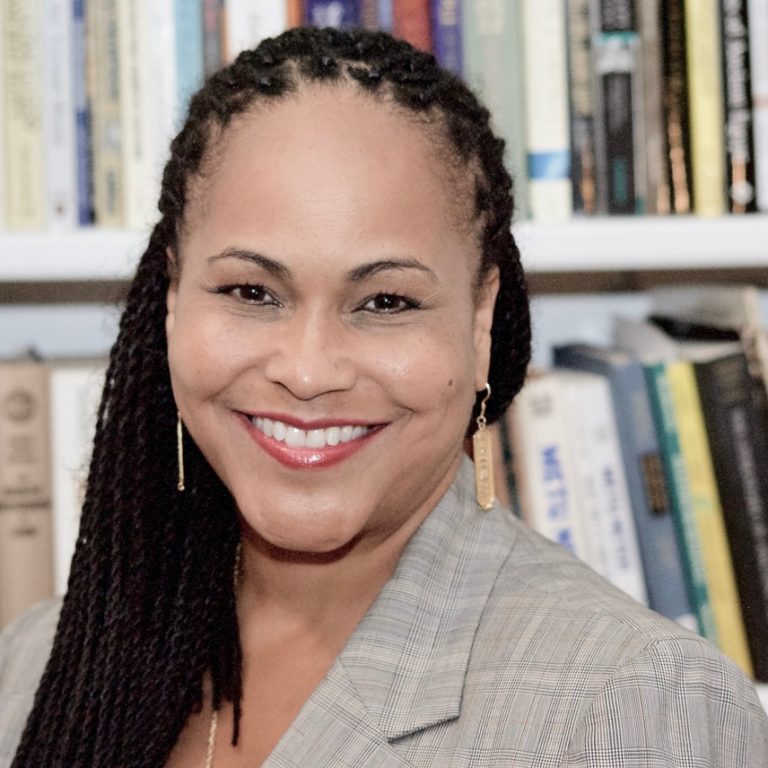
Every step of the way, change came about because of the work of the students, engaged collectively with faculty and staff. It’s a collaborative effort.
— Patricia Hilliard-Nunn, Senior Lecturer
The program has also long aimed to engage local high school students — as exhibited by the presence of local high schoolers and their teachers at the 50th-anniversary celebration. “What this celebration did is bring together the academic community with the Gainesville community. It highlighted the hand in handwork that we do,” Dr. Essegbey said. “That’s why it was important to invite students from the high school to the celebration. This belongs to them, too.”
Looking to capture a wide-ranging retrospective of the program’s first half-century seen over the two-day anniversary celebration, Gordon and Ortiz are working to publish a volume that can be used to introduce new UF students — or anyone at all — to African American Studies at UF. Continuing to highlight the effort that has been necessary to establish and sustain the program, they believe, will be important in the program’s next chapter.
“There’s no doubt in my mind if we mobilize resources that it could be one of the greatest not only in this region but in America and the world,” Gordon said. “We can’t fix the past, but we can shape the future.” Reaching that goal will count on the joint involvement of students, faculty, administrators and the greater community — as has been the case throughout the program’s history, Hilliard-Nunn noted before her passing. “Every step of the way, change came about because of the work of the students, engaged collectively with faculty and staff. It’s a collaborative effort,” she said. “Now the real work starts.”
Take a look at the photos below for more scenes from the celebration.
To further support this initiative and research of the college go to the link below.
